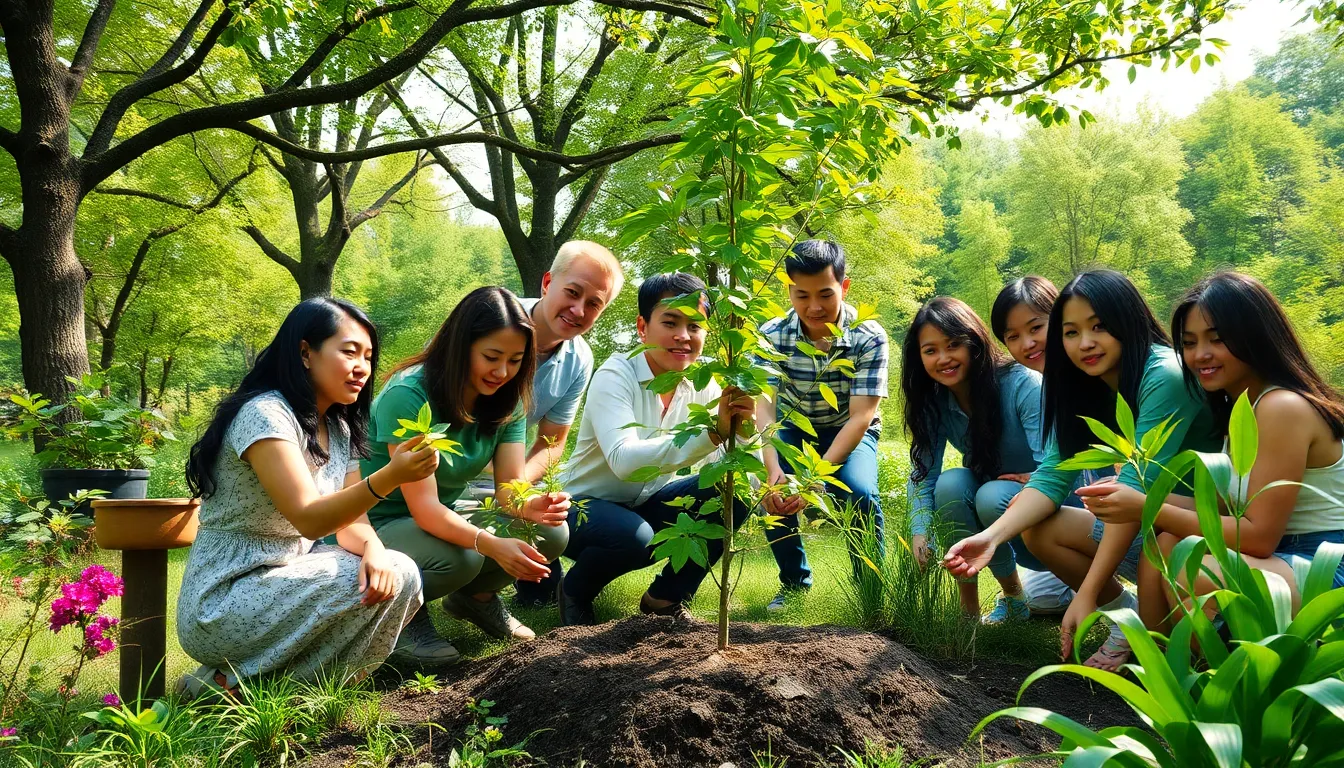Earth is like that friend who always picks up the tab but never asks for anything in return. It’s time to show some love! With climate change, pollution, and deforestation on the rise, it’s clear our planet needs a little TLC. Imagine a world where trees thrive, oceans sparkle, and wildlife roams freely—sounds like a dream, right? Well, it doesn’t have to be!
Conserving our Earth isn’t just a noble cause; it’s essential for our survival. By making simple changes in daily life, everyone can contribute to a healthier planet. So grab your reusable bags and put on your eco-warrior cape! Let’s explore how small actions can lead to big impacts, ensuring our beautiful Earth remains the vibrant home we all cherish. After all, who wouldn’t want to keep this rock spinning for generations to come?
Table of Contents
ToggleUnderstanding Earth Conservation
Earth conservation refers to the sustainable management of natural resources and the protection of ecosystems. It encompasses actions aimed at preserving biodiversity, mitigating climate change, and reducing pollution levels. Environmental degradation poses significant threats, including habitat loss and species extinction. These challenges must be addressed to foster a healthier planet.
Educating communities about environmental issues plays a critical role in conservation efforts. Awareness increases understanding and encourages proactive measures among individuals. Simple actions, such as reducing waste and recycling materials, contribute to resource conservation.
Implementing eco-friendly practices can make a considerable impact. Individuals can reduce their carbon footprint by adopting renewable energy sources like solar or wind power. Organic gardening practices help maintain soil health and promote local biodiversity.
Additionally, governments and organizations can play a significant part in Earth conservation. Enacting policies that promote sustainable practices supports long-term environmental health. Funding for conservation projects often leads to successful habitat restoration initiatives.
Participation in conservation initiatives strengthens community ties. Volunteering in local clean-up events or tree-planting activities fosters a collective sense of responsibility. Engaging with local environmental groups can amplify efforts and raise awareness of pressing issues.
Monitoring progress in conservation strategies ensures accountability. Measuring changes in biodiversity and pollution levels provides insights into the effectiveness of initiatives. A proactive approach is essential for sustaining the planet’s health and resources for future generations.
Importance Of Earth Conservation

Earth conservation plays a crucial role in ensuring a livable planet for current and future generations. Addressing environmental challenges leads to healthier ecosystems and communities.
Environmental Impact
Environmental conservation mitigates climate change by reducing greenhouse gas emissions. Healthy ecosystems provide clean air and water, which contribute to overall public health. Biodiversity flourishes in protected habitats, promoting resilience against climate effects. Habitat restoration supports endangered species and increases ecosystem services, such as pollination and soil fertility. Additionally, reducing pollution levels directly affects human health and decreases healthcare costs. Adopting conservation efforts enables communities to create sustainable practices, ensuring ecosystems thrive and risks of natural disasters diminish. Collective actions, such as reducing waste and supporting renewable energy initiatives, significantly enhance environmental health.
Economic Benefits
Investing in Earth conservation yields substantial economic returns. Sustainable practices foster job creation in sectors like renewable energy, eco-tourism, and organic agriculture. Efficient resource management lowers production costs for businesses and increases profitability. Ecosystem services, such as clean water supply and air purification, reduce government spending on environmental rehabilitation and health care. Furthermore, conserving natural resources ensures long-term availability, supporting industries dependent on these assets. Communities that prioritize conservation often see enhanced property values, attracting new residents and businesses. Maintaining healthy ecosystems contributes to a stable economy by mitigating the financial risks associated with climate change and environmental degradation.
Strategies For Earth Conservation
Implementing effective strategies for Earth conservation involves adopting sustainable practices and leveraging technological innovations.
Sustainable Practices
Individuals can adopt sustainable practices that directly benefit the environment. Utilizing reusable bags, bottles, and utensils reduces plastic waste. Choosing energy-efficient appliances cuts down on energy consumption. Supporting local and organic agriculture promotes biodiversity and reduces pesticide use. Additionally, practicing mindful consumption helps minimize unnecessary purchases. Engaging in community gardening projects fosters connections among neighbors while enhancing local food access. Recycling and composting also prevent waste from entering landfills. Each of these actions contributes to a healthier planet and encourages a culture of sustainability.
Technological Innovations
Technological innovations play a critical role in advancing Earth conservation efforts. Smart grid technology optimizes energy distribution and reduces emissions. Solar panels and wind turbines harness renewable energy, driving down reliance on fossil fuels. Electric vehicles contribute to cleaner air by minimizing greenhouse gas emissions. Moreover, advancements in biodegradable materials offer alternatives to traditional plastics. Precision agriculture tools increase efficiency by using resources sparingly, boosting yields sustainably. Drones assist in monitoring ecosystems, providing essential data for conservation projects. These innovations pave the way for a more sustainable future while addressing pressing environmental challenges.
Role Of Education In Earth Conservation
Education plays a crucial role in Earth conservation by increasing awareness about environmental issues. It equips individuals with the knowledge to understand climate change, pollution, and biodiversity loss. Schools and universities often introduce curricula centered around these topics, helping students grasp the importance of sustainable practices.
Communities also benefit from environmental education programs. Workshops and seminars enhance public understanding of local ecosystems and conservation efforts. Individuals who participate in these programs often become advocates for sustainability within their neighborhoods.
Hands-on learning experiences, such as community gardening and tree planting, foster a connection to nature. Children exposed to these activities develop a sense of responsibility toward the environment. Schools that integrate field trips to national parks or conservation areas further strengthen this bond.
Higher education institutions contribute by conducting research on ecological challenges. Findings from these studies can inform policy decisions and support innovative conservation strategies. Collaboration between academia and local governments often leads to impactful community initiatives.
Educational campaigns raise awareness about the consequences of biodiversity loss. Informational materials disseminated through social media and community boards reach wider audiences. People who understand these impacts are more likely to adopt sustainable practices.
Incorporating sustainability principles into business education also generates environmentally conscious entrepreneurs. These individuals create companies that prioritize eco-friendly products and services. Thus, education empowers the next generation to lead sustainable business practices that benefit the planet.
Overall, education fosters a culture of stewardship, encouraging individuals to take proactive measures. Knowledge serves as the foundation for meaningful action in Earth conservation. As understanding grows, so does the capacity to protect and sustain vital ecosystems for future generations.
Community Involvement In Earth Conservation
Community involvement plays a vital role in Earth conservation. Local groups often organize clean-up events to target polluted areas, empowering residents to take charge of their environment. Participating in tree-planting initiatives enhances green spaces, promotes biodiversity, and helps combat climate change. Collaboration among residents fosters a sense of collective responsibility for the planet’s well-being.
Neighborhood associations commonly initiate recycling drives, which increase awareness about waste management. Educational workshops help families adopt eco-friendly practices, leading to sustainable living. Engaging local businesses in conservation efforts can further amplify impact, creating a network of support for environmentally responsible initiatives.
Schools frequently implement programs that educate students about Earth conservation. Students participate in hands-on activities, such as community gardening, which nurtures a connection to nature and teaches essential skills. Learning about sustainability at a young age cultivates environmentally conscious adults who prioritize ecological health.
Volunteering with conservation organizations provides significant benefits. Individuals gain valuable experience while contributing to projects like habitat restoration and wildlife protection. These collaborations often yield measurable progress in restoring ecosystems and safeguarding species from extinction.
Online platforms serve as excellent resources for organizing community efforts. Local groups utilize social media to spread awareness and rally support for conservation activities. Digital tools help connect like-minded individuals, enabling more extensive networking and collaboration between communities.
Challenges arise, yet resilience is evident among those dedicated to conservation. Innovative solutions emerge from community leaders willing to experiment and implement new ideas. As engagement increases, so does the potential for lasting positive change in maintaining the Earth’s resources for generations to come.
Earth conservation is not just a responsibility; it’s an opportunity for everyone to contribute to a healthier planet. By embracing sustainable practices and actively participating in community initiatives, individuals can make a significant impact. The collective efforts of eco-warriors, supported by education and innovation, pave the way for a sustainable future.
As awareness grows and communities unite, the potential for positive change expands. Every small action counts in the journey toward preserving the environment. Together, they can ensure that future generations inherit a vibrant and thriving Earth, rich in resources and biodiversity. The time to act is now, as the health of the planet depends on the choices made today.





